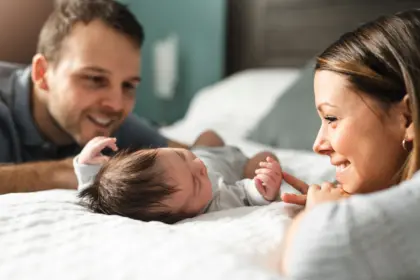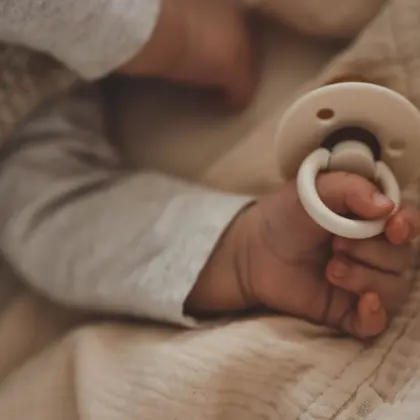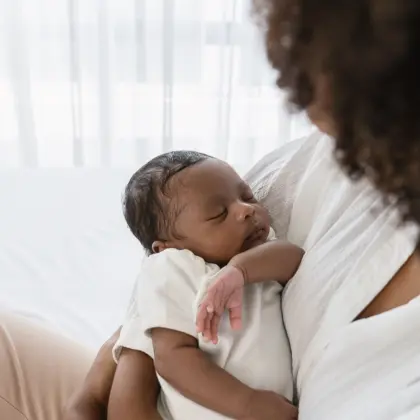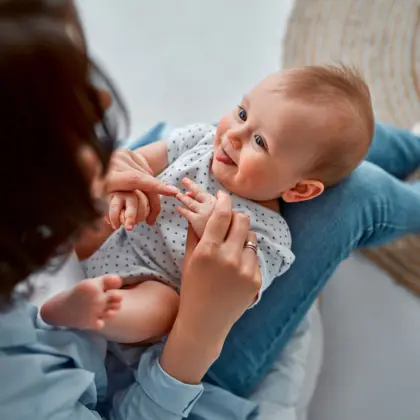0 - 3 Months
- Face-to-Face Interaction: Look into your baby's eyes, smile, and talk to them. This helps your baby feel loved and start to understand communication. Excessive use of mobile phones can interfere with these crucial moments of interaction. When an infant or young child babbles, gestures, or cries, and an adult responds appropriately, it helps build and strengthen neural connections in the child's brain. NHS - Bonding with Your Baby & Tiny Happy People - Activities for 0-3 month olds & Serve and Return: Back-and-forth exchanges
- Gentle Massage: Gently massage your baby to help them relax and improve their blood flow. NCT - Baby Massage
- Sensory Stimulation: Give your baby different textures and sounds to explore. This helps their brain grow. BBC Tiny Happy People
- Observe Reactions: Watch how your baby reacts to different things and change what you do based on their reactions. CBeebies - Social and Emotional Development

4 - 6 Months
- Peek-a-Boo: Play peek-a-boo to help your baby learn that things still exist even when they can't see them. It's also fun! BBC Tiny Happy People
- Grasping Toys: Give your baby soft, colourful toys to hold and explore. This helps them learn about their world. Understanding Cognitive Development: Different Stages and Piaget’s Theory - BBC Tiny Happy People
- Respond to Cues: When your baby makes sounds or moves, respond to them. This shows your baby that you are listening and that they are important. NHS - Bonding with Your Baby & Serve and return interactions with baby - how it helps baby brain development - BBC Tiny Happy People
- Rolling Over: Encourage your baby to roll over by placing toys just out of their reach. This helps them build their muscles. BBC Tiny Happy People
- Facial Expressions: Make different faces and talk about them. This helps your baby learn about emotions. CBeebies - Social and Emotional Development
7 - 9 Months
- Babbling Conversations: Talk back to your baby when they babble. This helps them learn to talk. Tiny Happy People - Activities for 6-9 month olds
- Crawling: Create a safe space for your baby to crawl and explore. This helps them learn about their environment. When do babies start crawling? Key stages, styles, and expert tips for helping your baby crawl - BBC Tiny Happy People
- Sharing Toys: Play with toys together and show your baby how to share. This helps them learn social skills.
- Interactive Books: Read books with textures and flaps to your baby. This makes reading fun and helps them learn. Bookstart in Wales | BookTrust
- Mirror Play: Use a mirror to help your baby recognize themselves and their movements. This helps them understand their own body. BBC Tiny Happy People Babies and mirrors: Why mirrors are good for your baby's development - BBC Tiny Happy People
10 - 12 Months
- Interactive Play: Play games like stacking blocks or putting objects into containers with your baby. This helps them learn problem-solving skills. Play for all ages - Make Time 2 Play
- Standing and Cruising: Help your baby stand and take steps while holding onto furniture. This helps them prepare for walking. BBC Tiny Happy People Baby Cruising - My BabyManual
- Praise Efforts: Praise your baby when they try new things. This builds their confidence. NHS - Bonding with Your Baby
- Simple Games: Play simple games that involve problem-solving and fine motor skills. This helps your baby learn and grow. Tiny Happy People: Activities for 9-12 month olds
- Nature Walks: Take your baby on short walks in nature. Talk about what you see, hear, touch and smell.This helps them learn about the world. Out & About



